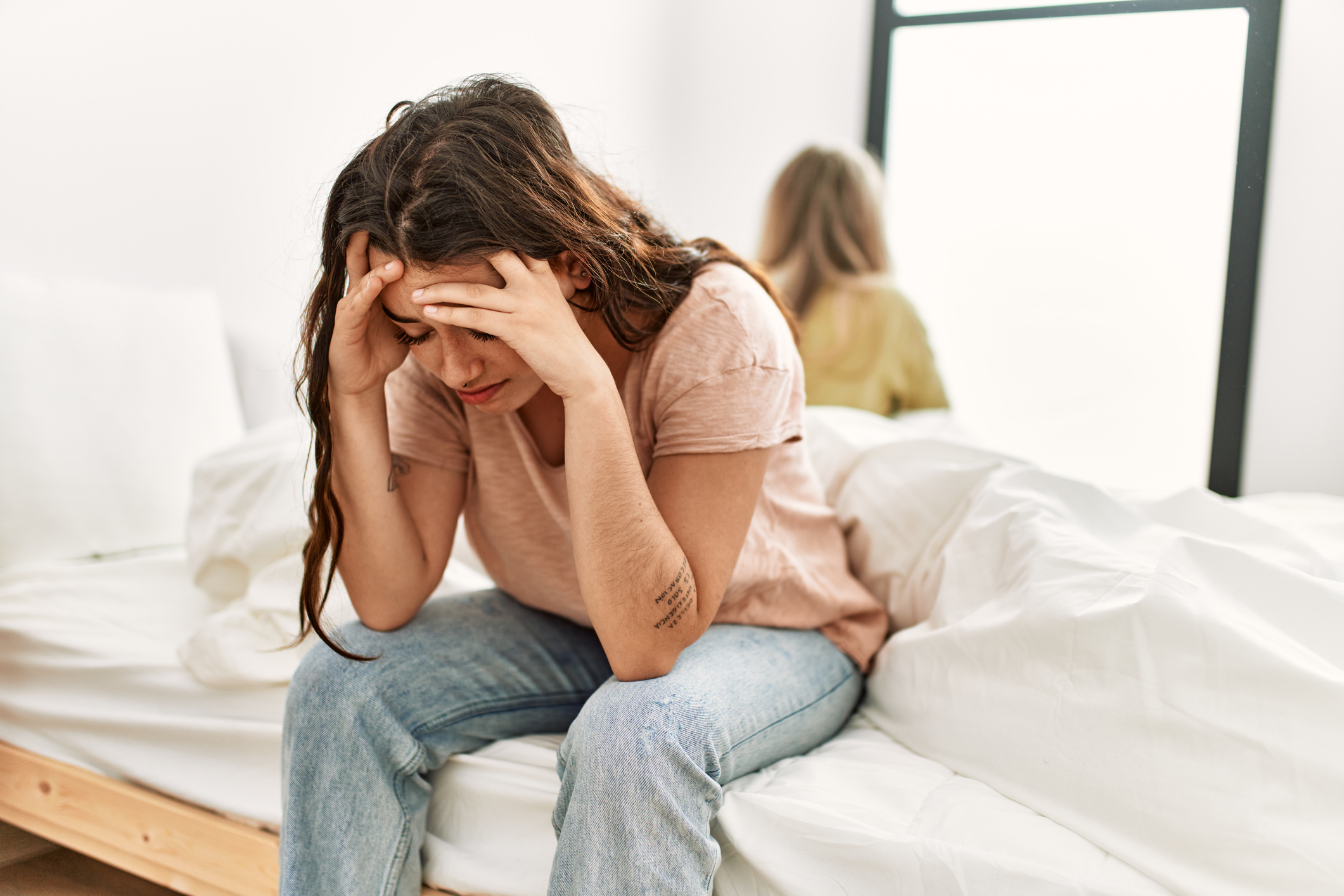Ask Beatty: How to Put the Sizzle in Your Sex Life

Dear Beatty,
I am a 45-year-old bisexual divorced woman, who has always enjoyed having sex with both men and women. Recently, to my surprise, I have ZERO interest in sex, despite the fact that I am in a great relationship with a woman who I care about and who I am very attracted to. I don’t know what’s happened to my sex drive, and my partner is becoming increasingly annoyed and frustrated with my lack of sexual desire. Can you help me figure out what could explain the “switch” and what I can do?
Sienna, Sag Harbor
Dear Sienna,
There are many possible reasons why you recently have lost your sex drive. Let’s explore each of them and see if together we can determine what’s happened and more importantly, how to turn the “switch” back on.
A Pittsburgh Western Psychiatric sex study involving 100 happy and very happily married heterosexual couples who were not in therapy, but who consciously or unconsciously knew that they needed some help in the bedroom found that:
1. 50% of the women had difficulty becoming aroused.
2. 46% of the women had difficulty achieving orgasm.
3. 15% of the women were unable to achieve orgasm under any circumstances.
4. 33% of the men experienced problems with premature ejaculation.
5. 52% of the men between the ages of 40–70 reported problems with erectile dysfunction.
If this is what is going on in the bedrooms of couples who describe their marriages as happy or very happy, you can only imagine the sexual difficulties that couples are experiencing whose marriages and relationships are less than satisfying. In fact, I see heterosexual, homosexual and bisexual couples of all ages and stages in life who rarely, if ever, have sex.
THE GOOD NEWS
I have identified eight reasons why people have problems in the bedroom. Unless all of these issues are acknowledged, addressed and RESOLVED, sex will continue to be a major source of frustration and disappointment.
1. First and foremost, each of us needs to be in a healthy emotional, psychological, psychiatric and physical state if we plan on having a good relationship, sexual or otherwise, with anyone. Issues including depression, anxiety, stress, lack of sleep, low self-esteem, eating disorders, body dysmorphia, hypothyroidism, substance abuse, early child sexual abuse, sexual assault and religions beliefs all affect sexual desire. It’s hard to feel sexy or sexual when we are battling depression or other “skeletons” in our closet. And even though we can’t change our histories, it’s important that if the problems persist, that you give yourself permission to reach out to a qualified professional, who will be able to help you work through the issues that are getting in the way of your life and relationships. This process will enable you to finally live in the moment, without having one foot in the past and one foot in the present. And don’t hesitate to have a complete physical, which can help rule out any physical problems.
2. Our relationships must be healthy and satisfying (at least for the majority of women), if we are to enjoy a satisfying sexual relationship. If we are not feeling close and safe and if we don’t feel that our partner cares about us sexually and emotionally, most women will not have much sexual desire, let alone be able to relax sufficiently to achieve orgasm. I routinely receive emails from college-age women who are surprised that they are not having satisfying sex and orgasms with their “hook-up” partners. My response to them is, “Why would you be surprised that a random ‘hook-up’ wouldn’t really care about whether you were sexually satisfied or not?”
3. Sexual side effects are common with a multitude of prescription and over-the-counter medications. The following are some of the more common medications that can interfere with your enjoyment of sex: tricyclic antidepressants, selective serotonin reuptake inhibitors (SSRI’s), Xanax, Valium, blood pressure medications, antiepileptics, antihistamines, decongestants, birth control pills, diuretics, beta blockers, antipsychotic medications and pain and cholesterol medications. Many of these medications can make it virtually impossible to be able to experience arousal and achieve orgasm. Speak with your doctors about these concerns, since frequently a change in medication or dose can make all the difference in the world. Be proactive!
4. Many people also experience unwanted sexual side effects from alcohol, marijuana, cocaine and other recreational drugs. So be alert to what you are experimenting with and the possible effects that they may be having on you physically, emotionally and sexually.
5. Physical illnesses will undoubtedly play havoc with sexual desire and performance. However, we can always touch, kiss and caress, which can be the greatest aphrodisiac of all at different times in our lives.
6. As men and women age, there are significant changes in our hormonal levels. Estrogen, progesterone and testosterone levels drop for women and testosterone levels can plummet for men. These changes can and do affect sexual desire and performance. I encourage you to speak with you doctor and discuss the pros and cons of hormone replacement therapy and other natural alternatives.
7. Erectile dysfunction. Instead of merely asking your doctor for Viagra, Cialis or Levitra, ask him/her to determine WHY you are having difficulty getting and maintaining an erection..Issues like nerve damage, blocked vessels, depression, performance anxiety, alcohol and drugs, including prescription medication, need to be ruled out FIRST as possible culprits.
8. Premature ejaculation. This is a fairly easy problem to resolve. It does take some “practice.” There are a few techniques including the “stop start” technique and the “squeeze” technique that can easily be learned. Numbing creams can also be helpful.
The majority of couples find themselves in a sexual rut from time to time during the course of their relationships. Work, children, money worries, illness, boredom, emotional and physical problems, lack of sleep, lack of exercise, poor diet can all lessen and even destroy our sexual desire. I always encourage couples to not let their sex lives go down the tubes. Create a romantic ambience. Keep yourself looking fit, attractive and sexy. Make dates for sex. Get a babysitter. Turn off your devices. If you wait for the “perfect” time, it may rarely if ever happen. Be adventurous. If you are comfortable, give yourselves permission to experiment with sex toys and pornography in the privacy of your home. And finally, it’s amazing what can happen when you decide to embrace Nike’s powerful JUST DO IT slogan in your relationship. And if you find that you are still experiencing sexual difficulties and malaise, don’t hesitate to contact a qualified sex therapist who can help you and your partner put your sex life back on track.
Beatty Cohan, MSW, LCSW, AASECT is a nationally recognized psychotherapist, sex therapist, author of For Better for Worse Forever: Discover the Path to Lasting Love, columnist, national speaker, national radio and television expert guest and host of The Ask Beatty Show on the Progressive Radio Network. She has a private practice in New York City and East Hampton.
Beatty would love to hear from you and welcomes your questions and comments. Email her at BeattyCohan.msw@gmail.com or visit BeattyCohan.com for more information.




